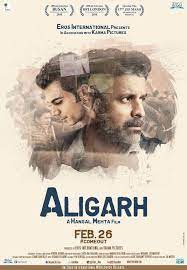
ALIGARH
India, 2015, 114 minutes, Colour.
Manoj Bajpayee, Rajkummar Rao.
Directed by Hansal Mehta.
Aligarh is a city in Uttar Pradesh. Its University is amongst the top three intellectual centres in India.
This film is based on actual characters and events, filmed only a few years after they occurred. For those interested in further detail, the Wikipedia entries concerning the Professor as well as his court case provided information.
Manoj Bajpayee gives an excellent, restrained performance as a linguistics academic, a published poet, who is seen coming to his house in a rickshaw, then home invasion by photographers, then the presence of three academics from the University, discovering him in a homosexual relationship with the rickshaw driver. The academics are there, allegedly, to stop any scandal for the University but, the next day, the story and photos are in all the local papers. The Professor is brought before the university authorities, suspended, castigated for his behaviour and the scandal, told to move out of his house within a week.
In the meantime, the story attracts the attention of a young deli journalist, Deepu, who comes to Aligarh to interview the Professor, along with an over-eager photographer. He shows sympathy, gets into the apartment, but the Professor reacts to his questions and sees the photographer. Later, Deepu tries again, helping the Professor connect power to his house when the university authorities have cut it off.
The Professor is reticent, talks about his poetry to Deepu, gives him a signed copy. Later, during his trial, bored, he translates the poems into English and again gives the journalist copy.
The Professor is persuaded to go to court even though he does not wish it. Decriminalisation of homosexuality had been recently withdrawn, so there was a case for charges for the, invasion of his privacy, invasion of his home.
There are court sequences, a barrister had been involved in the social legislation for the Professor, the loudly-spoken woman has prosecution, giving all the arguments the reputation of the University.
Ultimately, Deepu writes his article after trying to track down the rickshaw man and had been bashed by the people in his town. He is acclaimed for his writing, is promoted, goes to see the Professor and is promised an interview but, that night, the Professor dies. Poison is founded his system, suicide suspected. Later accusations were made about his murder.
Soon after, homosexuality was re-criminalised. And this film came out the following year.
- Based on a true story? India and the 2000s? Indian society, the issue of homosexuality, criminalisation, change in legislation, reverting to criminalisation in 2014?
- This film as a portrayal of the history of the events, as a protest against the criminalisation?
- The title, the area in Uttar Pradesh, the city, the status of the University? Its reputation, status, the action of the authorities against the Professor?
- The picture of the city, immersing the audience in the atmosphere, the streets, the rickshaw, day and night, the house, the exterior windows, the interiors? The University offices? The different hotels and accommodation? The court hearings? And the demonstrations in the streets? The musical score?
- The situation, the professor and the rickshaw, going into the house, the home invasion, filming the professor and his partner, the photographs, the arrival of the authorities, the humiliation, not allowing them their clothes, the alleged secrecy, the newspapers all publishing the news and photos? The scandal?
- Deepu, journalist, his work at the paper, his boss, interested in the story, wanting to follow through? His work with his photographer? The attempts to see the professor, helping him, questions, the photographer and his incessant taking pictures despite Deepu trying to stop him? Deepu ousted? His later visiting the professor, helping him with the electricity, a more sympathetic hearing, the professor explaining himself and his story? Deepu’s response, writing the article?
- Deepu, at home, his aunt, the children, his being upset, walking out? At the office, his eventually publishing the article, his promotions, acclaim?
- The film’s portrait of the professor, age, a quiet man, the story of his life, severity of his upbringing, his studies, languages, specific language in Aligarh, a poet, his poetry, the recitation of the poems, especially about the moon, Deepu listening, the professor giving him a book, signed, (and his later translating the poem during the court case and giving Deepu the manuscript)?
- Issues of homosexuality, criminalised in India, the change? The demonstrators? The professor unwilling to go to court, quiet, persuaded? His sitting in the court, bored, nodding off, translating his poems? The background of his having to move, the University ousting him, alternate accommodation, his being pursued, his not being married and therefore having to leave accommodation?
- The discussions with the barristers, the sympathetic barrister, especially his connection with the decriminalisation legislation? The prosecution and her severity, shouting, talking over people? The judge, listening?
- The small court room, the shared lectern, the Professor sitting on the window ledge, the statements, the arguments, the University, exceeding its role, invading privacy, the commissioning of the photographs, the publication?
- Deepu, his trying to track down the rickshaw man? His being beaten? And the suggestion of the collusion by the rickshaw driver, the sequences of the lights going on and off, as a signal for outsiders?
- The aftermath of the case, Deepu and his writings, his visiting the professor, the professor and his being weary, promising for an interview the day after next, his lying back, his death?
- Reports that he had committed suicide, poison found? Later investigations, culprits charged but the case not proven?
- The sympathetic portrait of a gay man, quiet, not flamboyant, persecuted?
- The film being made soon after the re-criminalisation of homosexuality?